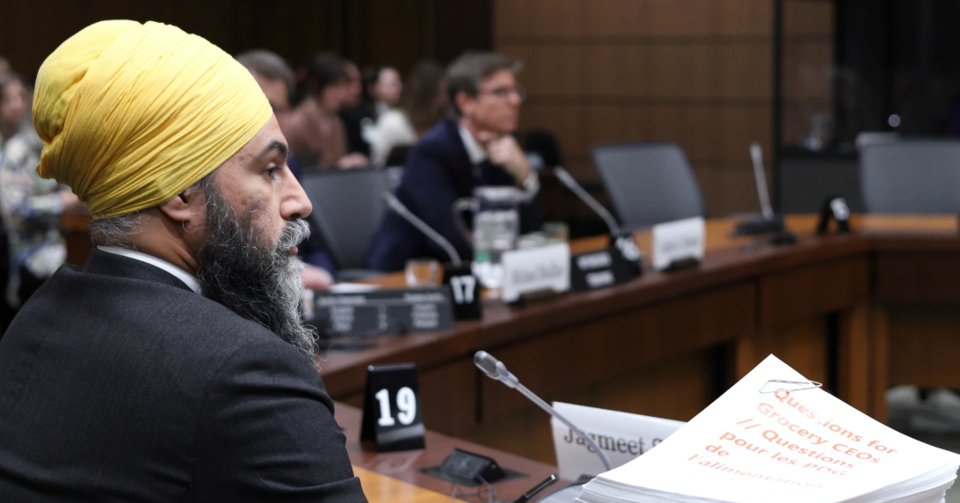Canadians didn’t get the full picture when grocery CEOs raking in record profits testified before a parliamentary committee tasked with investigating the drivers of high food prices, an economist and tax specialist said.
The country’s biggest grocery CEOs were asked to testify amid calls from politicians and civil society groups for greater transparency, which many hoped would arise in Wednesday’s committee meeting when MPs questioned the grocery magnates.
“They’re well-trained in their talking points, which are to claim they're here to serve Canadians,” said DT Cochrane, an economist with Canadians for Tax Fairness. The three leaders of Loblaw Cos. Ltd., Metro Inc. and Empire Co. Ltd. came prepared with numbers that show them in the best possible light, unsurprisingly, leaving Canadians without the full picture, he said.
The Standing Committee on Agriculture and Agri-Food’s study into food price inflation has captured the attention of Canadians grappling with the cost of groceries, which reached a 41-year high in October 2022. Empire CEO Michael Medline cited profit margins of 2.5 per cent, while Loblaw CEO Galen Weston Jr. said his company’s grocery arm operates on a four per cent profit margin.
For Loblaw, this translates to roughly $1 of profit on a $25 basket of groceries, so the “idea that grocers are causing food inflation is not only false, it's impossible,” Weston told the committee.
The profit margins cited by the CEOs include operating expenses like taxes, payroll and the cost of advertising, said Cochrane.
“It also includes costs like the obscene bonuses that the CEOs receive,” he added. Instead, he looks at the gross markup: how much the companies add over and above the cost of the goods they sell.
In 2019, Loblaw’s markup was 44.3 per cent, and in 2022, it rose to 46.7 per cent, based on the company’s financial statements. While that’s only a 2.4 per cent increase, Loblaw’s revenues are huge, so it makes a big difference, said Cochrane. For example, in 2022, Canadians would have saved close to $900 million if Loblaw had kept its 2019 markup.
“I’m going to be asking you tough questions,” NDP Leader Jagmeet Singh told the CEO of Loblaw, Canada’s largest food retailer, when Weston approached him for a handshake a few minutes before their much-anticipated confrontation.
Singh sat a few metres away from Weston and Medline, with a foot-high stack of papers to his right.
The federal NDP advertised the showdown between Weston and Singh on its website and social media, giving Canadians the option to RSVP to watch the committee meeting. Enough people RSVP’d to crash the website the day before the meeting, according to a tweet from the NDP’s official account.
Brandishing the towering stack of more than 2,000 questions Canadians had submitted for the grocery CEOs, Singh went on the offensive, repeatedly asking Weston how much profit is too much and contrasting the company’s record profits with the reality that Canadians are hurting from high food prices.
“I understand how difficult it is for so many Canadians,” was one of Weston’s responses, adding the company is “actively lowering prices on key essentials” and selling many of them at a loss.
This statement from Weston — born into one of Canada’s most powerful wealthy families, which owns the massive holding company George Weston Ltd — “rings completely hollow,” said Cochrane.
“The idea that he can empathize with the average Canadian family living paycheque to paycheque, just, it's galling,” said Cochrane, who read a transcript of the meeting.
According to the Globe and Mail, Weston’s 2021 pay package included a $730,546 salary, a $2.17-million bonus and share and stock option awards valued at $2.47 million.
In 2020, the financial performance of George Weston Ltd. — the holding company for Loblaw and Choice Properties Real Estate Investment Trust — would have resulted in some bonus payments being zilch, but the company opted to pay out those bonuses anyways, according to a 2021 report by the Canadian Centre for Policy Alternatives.
As for Loblaw selling some products at a loss? Cochrane says this isn’t an act of kindness to Canadians, but rather a pricing strategy designed to “get more money out of us” by attracting people into the stores where we end up buying higher-margin items.
Though Singh came out swinging — and was even asked to rein it in by committee chair Kody Blois after an initial exchange with Weston — other MPs asked tough questions of the three CEOs in attendance.
Throughout the committee meeting, the CEOs maintained they are not profiting from inflation and pointed to increased costs along the supply chain as proof they, too, are victims of inflation.
The day after the testimony, the Canadian Labour Congress issued a statement urging the federal government to crack down on corporate greed and stop wealthy CEOs from price-gouging Canadians on everyday essentials.




